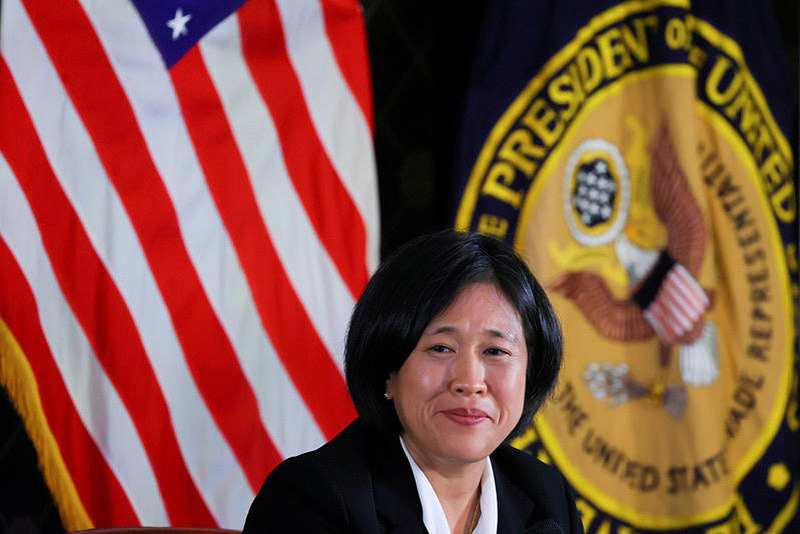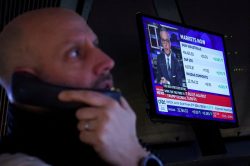
U.S. Trade Representative Katherine Tai addresses the Geneva Graduate Institute in Geneva on Oct. 14.
November 13, 2021
WASHINGTON (Reuters) — The United States said Friday it will open talks with Japan that could lead to an easing of tariffs on steel and aluminum imports, a longstanding irritant in trade relations between the two allies.
The U.S. Commerce Department and the United States Trade Representative’s Office said the talks were aimed at addressing “global steel and aluminum excess capacity,” restoring market-oriented conditions and preserving critical industries.
The discussions with Japan follow an agreement by the United States and the European Union to end a dispute over steel and aluminum tariffs, and hammer out a global arrangement to combat “dirty” production and overcapacity in the industry.
The future agreement, which is open to other countries, will pose a challenge for China, which produces over half of the world’s steel and which the EU and United States accuse of creating overcapacity that harms their own industries.
Last year, the Global Forum on Steel Excess Capacity estimated the gap between global steelmaking capacity and global demand at an excess of nearly 600 million tons, a sum that will continue to grow given new capacity already planned or underway.
Japan recently asked the United States to abolish the Section 232 tariffs imposed by former U.S. President Donald Trump’s administration in 2018.
Friday’s announcement comes before separate visits to Japan by Commerce Secretary Gina Raimondo and U.S. Trade Representative Katherine Tai beginning this week.
The United States said the two countries will seek to address concerns over the Section 232 tariffs “and the sufficiency of actions that address steel and aluminum excess capacity with the aim of taking mutually beneficial and effective actions to restore market-oriented conditions.”
“It’s about time,” said Myron Brilliant, head of the international affairs at the U.S. Chamber of Commerce. “The tariff exclusion process needs to take place with Japan and Korea and the U.K. We’re strongly encouraged by any signals that the administration is pursuing that.”
Tai is also due to visit South Korea this month, but sources said they did not expect a similar announcement there.
The U.S.-EU deal ended a festering dispute over the Trump-era U.S. steel and aluminum tariffs and averted a spike in EU retaliatory tariffs.
The agreement maintains Section 232 tariffs of 25% on steel and 10% aluminum, while allowing “limited volumes” of EU-produced metals into the United States duty-free.
It requires EU steel and aluminum to be entirely produced in the bloc — a standard known as “melted and poured” — to qualify for duty-free status. The provision is aimed at preventing metals from China and non-EU countries from being minimally processed in Europe before export to the United States.
Under the deal, Europe agreed to drop retaliatory tariffs against U.S. products, a move Raimondo said would reduce costs for steel-consuming U.S. manufacturers.
The Japanese steel industry is concerned that the U.S.-EU agreement will result in a comprehensive relaxation of measures for certain countries and regions, Eiji Hashimoto, chairman of the Japan Iron and Steel Federation, said.
Top Articles in News Services
-

Survey Shows False Election Info Perceived as True
-

Prudential Life Expected to Face Inspection over Fraud
-

Hong Kong Ex-Publisher Jimmy Lai’s Sentence Raises International Outcry as China Defends It
-

Japan’s Nikkei Stock Average Touches 58,000 as Yen, Jgbs Rally on Election Fallout (UPDATE 1)
-

Trump Names Former Federal Reserve Governor Warsh as the Next Fed Chair, Replacing Powell
JN ACCESS RANKING
-

Japan PM Takaichi’s Cabinet Resigns en Masse
-

Japan Institute to Use Domestic Commercial Optical Lattice Clock to Set Japan Standard Time
-

Israeli Ambassador to Japan Speaks about Japan’s Role in the Reconstruction of Gaza
-

Man Infected with Measles Reportedly Dined at Restaurant in Tokyo Station
-

Videos Plagiarized, Reposted with False Subtitles Claiming ‘Ryukyu Belongs to China’; Anti-China False Information Also Posted in Japan
























